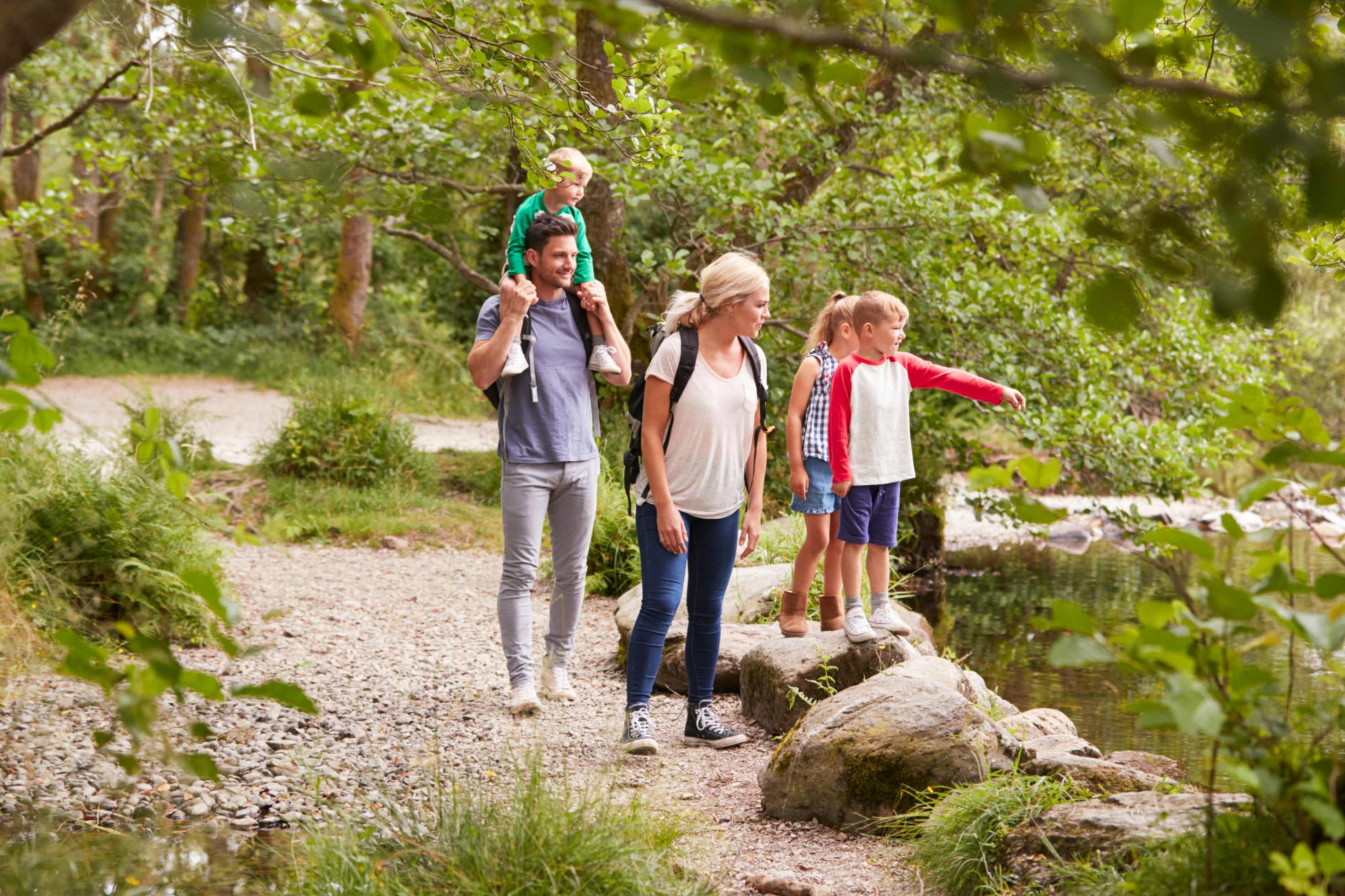Spending time outdoors is not just enjoyable it's fundamental to our health and vitality. In our increasingly urbanized and technology-focused lives, the profound health benefits of outdoors often gets overlooked.
Reconnecting with the natural world can be a powerful antidote to the pressures of modern living, reducing stress and offering a wide range of other advantages to your physical and mental health.
This exploration will highlight how stepping into the great outdoors can significantly improve your overall quality of life and contribute to a longer and healthier life.
The Mental Health Perks of Outdoor Time
Our brains are naturally attuned to nature, and a wealth of research confirms this fact. Studies cataloged in resources like the National Library of Medicine highlight the many health benefits of outdoors, especially for mental well-being.
Time spent in natural settings has been shown to reduce stress, improve mood, and support emotional resilience. The great outdoors offers more than just fresh air—it provides a therapeutic space that nurtures both body, mind, and soul.
Stress Reduction
Have you ever felt a sense of calm wash over you after a walk in a park or a forest? This isn't just a feeling; it's an innate physiological response.
Exposure to green spaces demonstrably lowers cortisol levels, which is the body's primary stress hormone, playing a crucial role in how we manage daily pressures.
The practice of forest bathing, originating from Japan, specifically focuses on immersing oneself in the atmosphere of the forest for stress reduction.
Research highlights that even short periods of time outdoors, such as 20-30 minutes in a natural setting, can lead to a significant decrease in stress markers. This simple act can be a powerful tool to reduce stress and improve mental health.
This reduction in stress is not merely a fleeting sensation. Consistent engagement with nature can contribute to a more resilient stress response system over time, helping to buffer the health impacts of chronic stress.
Access to green space can therefore be considered an important factor for your health. 🌳

Mood Booster
If you're feeling down or experiencing low spirits, the outdoors can act as a natural mood elevator. Spending time in nature has been consistently linked with decreased symptoms of anxiety and depression, offering a gentle yet effective way to improve mental health.
The vibrant colors, natural sounds, and fresh air all contribute to a more positive outlook.
A notable Stanford University study discovered that people who walked for 90 minutes in a natural area, compared to those who walked in an urban setting, showed reduced activity in the subgenual prefrontal cortex, a brain region associated with rumination and depression.
This suggests that nature can actively shift brain activity towards a more positive state. This connection supports the idea that nature improves our emotional regulation and overall mental wellbeing.
This mood-enhancing effect is partly attributed to the biophilia hypothesis, which suggests humans have an innate tendency to connect with nature. Regular exposure to natural environments can help fulfill this intrinsic need, leading to higher levels of happiness and satisfaction.
Improved Focus
Struggling to concentrate on tasks or feeling mentally drained? A break to the out of doors might be precisely what you need.
Nature has a remarkable ability to restore our attention spans and alleviate mental fatigue and brain fog, allowing for clearer thinking and better cognitive performance.
This phenomenon is explained by Attention Restoration Theory (ART), which posits that natural environments engage our "soft fascination," allowing the "directed attention" parts of our brain to rest and recover.
Unlike urban environments full of stimulating distractions that demand constant focus, natural settings are calming and restorative. This can significantly enhance problem-solving abilities.
This cognitive benefit is particularly valuable in our information-saturated world. Taking short nature breaks during work or study can lead to improved productivity and creativity upon return.
Physical Health Benefits of the Great Outdoors
The advantages of spending time outdoors extend robustly to our physical health. Our bodies also thrive when exposed to the natural world, experiencing a variety of positive health outcomes.
Let's look at some of the key physical perks the great outdoors offers, contributing to overall good health.

Stronger Immune System
Trees and plants release airborne chemicals called phytoncides, which are natural antimicrobial organic compounds.
When we inhale these substances, our bodies respond by increasing the number and activity of natural killer (NK) cells, a type of white blood cell crucial for fighting off viral infections and detecting and destroying tumor cells.
A study documented in Environmental Health and Preventive Medicine demonstrated that people who spent time in forest environments exhibited increased NK cell activity for over 30 days following their trip.
This suggests that regular time spent in nature can provide a sustained boost to the immune system, improving physical resilience. This contributes to a decreased risk of various illnesses.
This natural boost to our defenses is a key component of how spending time outdoors can contribute to a longer life and improved health.
The fresh air itself, often cleaner in natural settings, reduces exposure to indoor pollutants that can weaken immunity. Regular physical activity often accompanies outdoor excursions, further supporting immune function.
Better Heart Health
Spending time in natural surroundings can significantly benefit your cardiovascular system!
Research consistently shows that exposure to nature can lead to lower blood pressure, a slower heart rate, and reduced levels of stress hormones, all of which are beneficial for heart health. This can help reduce the risk of heart disease.
A comprehensive population study found a strong correlation between living in greener areas and a lower risk of cardiovascular disease and stroke.
This effect is likely due to a combination of factors, including cleaner air, increased
opportunities for physical activity, and the stress-reducing qualities of green space. Reducing these risks is vital in combating chronic disease.
Nationwide prospective cohort studies are continually exploring the links between green space exposure and cardiovascular health outcomes. Evidence suggests that even passive exposure to natural environments, like having views of trees from a window, can have positive effects.
Post-surgical patients with windows facing natural settings recovered more quickly and had fewer complications. Making time outdoors a regular part of life can be a preventative measure against various heart-related health problems.

Increased Vitamin D
Sunlight is our primary natural source for Vitamin D synthesis, a crucial nutrient for bone health, immune function, mood regulation, heart disease, and much more.
Spending just 10-30 minutes in midday sun, a few times a week, may be enough for our bodies to produce adequate levels of this essential vitamin, depending upon season and how you assimilate vitamin D. This natural light helps support a wide range of bodily functions.
Vitamin D deficiency is a prevalent public health issue, linked to an increased risk of osteoporosis, cancer, and autoimmune diseases.
Ensuring sufficient vitamin D levels through safe sun exposure can improve physical health and overall vitality. Many people who spend time outdoors find they naturally meet their Vitamin D needs, especially during the summer when skin tends to be more exposed.
It's important to balance sun exposure with safety. Always use sunscreen during prolonged periods outdoors (but generally not for the first 20-30 minutes) and be mindful of peak UV radiation hours, especially during summer months.
The Outdoor Boost to Overall Well-being
Beyond specific mental and physical benefits, spending time outdoors contributes to an enhanced overall quality of life and improved health. The cumulative effect of these experiences fosters a sense of vitality and balance.
Health impacts of time outdoors are often interconnected, leading to a holistic improvement in how we feel day-to-day.
Better Sleep
If you find yourself struggling with insomnia or irregular sleep patterns, regular outdoor time could offer a natural solution. Exposure to natural light, especially early in the morning, helps regulate our body's internal clock, known as your circadian rhythm.
The circadian rhythm governs our sleep-wake cycles and syncing it with natural light patterns can lead to more restful and restorative sleep.
A compelling study in the journal Current Biology revealed that a week of camping, with exposure only to natural light and darkness, effectively reset participants' circadian rhythms to align with sunrise and sunset.
This shift led to earlier bedtimes and improved sleep quality. Even less immersive daily exposure to natural light helps support these vital rhythms.
Improved sleep, in turn, has a cascade of positive effects on both mental and physical health, including better mood, enhanced cognitive function, and a stronger immune system. Therefore, the simple act of getting outside can indirectly bolster many positive health outcomes.

Increased Creativity
Feeling stuck in a creative rut or facing a complex problem? A dose of nature might be the key to unlocking fresh perspectives.
Research suggests that time spent in natural environments can significantly enhance problem-solving abilities and foster creative thinking. This is partly because nature allows our minds to wander and make new connections.
Psychologists from the University of Utah and University of Kansas conducted a study where backpackers scored 50% higher on a creativity test after spending four days immersed in nature, disconnected from technology.
The findings highlight the profound impact that disconnection from daily stressors and immersion in a natural setting can have on our cognitive flexibility. Nature improves our capacity for innovative thought.
This boost in creativity isn't limited to artistic endeavors. It can apply to problem-solving in all areas of life, from work challenges to personal dilemmas. The fresh air and different sensory inputs stimulate the brain in novel ways.
Social Connections
Outdoor activities frequently provide opportunities for social interaction, which is essential for our mental wellbeing.
Whether it's a planned group hike, joining a community gardening project, or simply chatting with neighbors in a local park, these interactions foster a sense of belonging. This human contact is vital for a healthy social life.
Research featured in the International Journal of Environmental Research and Public Health indicated that group nature walks were associated with significantly lower levels of depression and perceived stress, as well as enhanced positive affect.
Shared experiences in nature can strengthen bonds and create supportive social networks. Social interaction in pleasant environments elevates mood.
These social benefits are particularly important in an age where loneliness is a growing public health concern.
Outdoor spaces often serve as natural meeting points, encouraging spontaneous interactions and community engagement. Engaging in regular physical activity with others outdoors combines multiple benefits.
How to Maximize Your Health Benefits of Outdoors
To fully harness the positive health impacts of the outdoors, it's useful to be intentional about how you spend your time in nature.
Here are some practical tips to help you get the most out of your experiences with green space and fresh air. These strategies can help you improve physical and mental health consistently.

Choose Green Spaces
While any time spent outdoors is beneficial, studies consistently show that environments rich in natural green elements offer more profound benefits. Choose parks with abundant trees, serene forests, community gardens, or other natural settings whenever possible.
The more natural and diverse the environment, the greater the potential for positive green space exposure.
Unplug and Immerse
Try to disconnect from technology during your outdoor time. Leave your phone behind, or at least switch it to airplane mode, which allows you to be more present and immerse yourself in the natural world. This break from constant digital stimulation is crucial for mental recuperation.
Digital detox, even for short periods, can reduce feelings of overwhelm and improve your ability to connect with your surroundings.
It allows your senses to engage with the sights, sounds, and smells of nature. The health impacts of such mindful disconnection are increasingly recognized.
Mix It Up and Stay Active
Keep your outdoor experiences fresh and engaging by trying a variety of activities. Different settings and activities can offer unique benefits and keep you motivated. These could range from vigorous hiking to gentle gardening, birdwatching, or simply sitting peacefully in a park.
Being physically active in nature combines the benefits of exercise with the restorative qualities of the environment. Activities like swimming in natural waters, kayaking, or rock climbing offer both physical challenges and deep connection with the natural world.
Consider exploring different types of green spaces in your area. National parks, local trails, botanical gardens, and even urban greenways offer diverse experiences.
Many health organizations are now recognizing the therapeutic potential of nature and recommending it as a complementary approach to conventional treatments. This aligns with a broader understanding of human health and its deep connection to the natural environment.
Conclusion
The health benefits of outdoors are extensive and well-documented, touching nearly every aspect of our lives.
From alleviating stress and elevating mood to bolstering physical health, strengthening the immune system, and sparking creativity, nature provides a powerful, accessible, and free resource for enhancing our overall well-being and contributing to improved health outcomes.
The evidence suggests that time in the great outdoors is not a luxury but a fundamental component of a healthy lifestyle.
Whether it's a quiet moment in a local park or an adventurous trek in the wilderness, every interaction with the natural world offers an opportunity to improve physical and mental health.
So, make a conscious effort to step outside today and embrace the gifts that nature offers!

Frequently Asked Questions
1. Why is time spent outdoors good for your health?
Time outdoors supports both mental and physical well-being. It reduces stress, improves mood and sleep, enhances focus and creativity, strengthens the immune system, and boosts heart health and vitamin D levels. It also boosts creativity and problem-solving abilities.
2. What are the health benefits of spending time in nature?
Spending time in nature reduces cortisol (stress hormone), eases anxiety and depression, sharpens focus, boosts immunity, lowers blood pressure, improves sleep, increases creativity, and fosters social connections.
3. What is forest bathing and how does it improve health?
Forest bathing is the practice of immersing oneself in a forest setting to relax and connect with nature. It highlights the powerful health benefits of outdoors by lowering stress, reducing cortisol levels, and enhancing immune function through exposure to phytoncides—natural compounds released by trees.





Share:
Fit During Travel
Adult Bedtime Routines